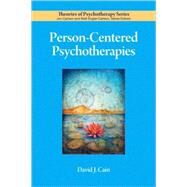Person-centered Psychotherapies
, by Cain, David J.- ISBN: 9781433807213 | 1433807211
- Cover: Paperback
- Copyright: 2/15/2010
In Person-Centered Psychotherapies, David J. Cain discusses the history, theory, research and practice of this seminal approach whose basic premises have influenced the practice of most therapeutic systems. Person-centered therapy, also called client-centered therapy, was created by Carl Rogers almost 70 years ago. In polls of psychotherapists conducted in 1982 and 2007, Carl Rogers was voted the most influential psychotherapist in history. His original approach gave rise to a number of variations on the original, all of which may be classified as person-centered psychotherapies because of their basis in Rogers' core therapeutic conditions of empathy, unconditional positive regard, and congruence. This model emphasizes the clienttherapist relationship, focusing on how the quality of moment-to-moment engagement between therapist and client can create optimal conditions for client growth. Person-centered therapies view clients as resourceful persons capable finding their own directions and solutions for their problems, and a fundamental value of the person-centered therapist is to honor and preserve the client's autonomy and choice. In this book, Dr. Cain presents and explores person-centered psychotherapy, its theory, history, therapy process, primary change mechanisms, the empirical basis for its effectiveness, and contemporary developments that have refined theory and expanded how it may be practiced. In recent years dialogical, experiential, existential and expressive-creative influences have been integrated in practice. This essential primer, amply illustrated with case examples featuring diverse clients, is perfect for graduate students studying theories of therapy and counseling as well as for seasoned practitioners interested in understanding how it has evolved in recent decades.







